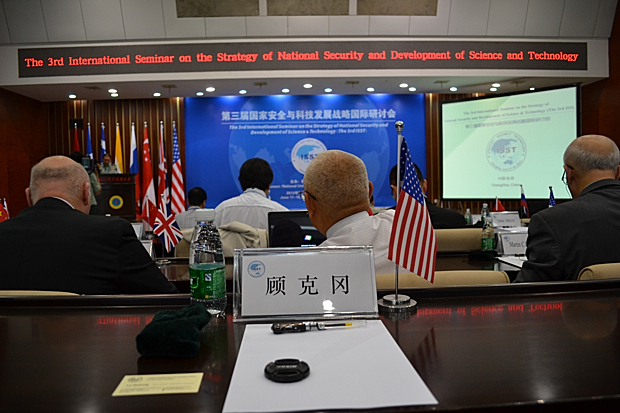
A personal view of the opening moments of an international conference on space and cyber security at China’s National University of Defense Technology.
After traveling the U.S. equivalent of the distance between Philadelphia and Orlando in just under six hours on China’s high speed rail network, I arrived at the National University of Defense Technology in Changsha for a conference on space and cyber security. The university hosts some of China’s most advanced technology, including the world’s fastest supercomputer. The presentations and discussions I attended made it clear that despite all of the talk about the supposed rise of China and the imagined decline of the United States, Chinese security analysts and military officials remain concerned about a scientific and technological arms race they can not win.
These concerns are not new. In many ways the search for security through scientific achievement defines the history of modern China. A rich Chinese discourse about the relationship between science and security, founded on the questionable hypothesis that traditional Chinese civilization failed to produce the sciences that gave the West a decisive military advantage, began in the wake of China’s defeat in the Opium Wars. As it has for generations, this ongoing discourse affects Chinese domestic politics and government. Within the U.S. government, however, Chinese security concerns are interpreted through a comparatively narrow view of the Chinese historical memory.
Inside the U.S. security establishment, conversations about a supposed Chinese obsession with a century of humiliation focus on well-known Chinese territorial claims. Jeffrey Bader, an architect of the Obama administration’s China policy, associates Chinese investments in military modernization with “irredentist aims.” The military initiatives included in the U.S. “pivot” toward Asia, announced with great fanfare by President Obama in Canberra in 2011, are guided by this widely held U.S. impression of Chinese intentions.
The President may be missing the forest for the trees. Chinese discussions of their security concerns are not focused on territory. Chinese security analysts take a very broad view of the global situation and most believe the existing international order, created and maintained by the leadership of the United States, is increasingly unstable and may be unsustainable. They find this frightening and with good reason. The health and well-being of the 1.4 billion they speak for depends on it.
Perhaps this is why the lion’s share of the opening presentation from a retired PLA general at a conference on space and cyber security focused on global finance, which he described as if it were a U.S. weapon. U.S. China analysts pay attention to Chinese discussions about “comprehensive national power,” which include economic factors, but they tend to neglect equally important Chinese conversations associating interdependence with national security. The Chinese leadership’s interest in a “new type of great power relationship” is not focused on how to manage military clashes over the disputed territories on China’s periphery, North Korea policy or any of the other specific issues the United States wants to discuss. If the general is a faithful reflection of internal debate—an admittedly questionable proposition— the Chinese push for a new type of relationship with the United States appears to be a request, that could turn into a demand, to have Chinese concerns about a failing international order treated with respect in a global conversation about the creation of a more stable and sustainable alternative.
The United States government is not willing to engage in that discussion. Instead, at least from the general’s point of view, the U.S. is investing heavily in continuing to acquire ever more sophisticated military capabilities it can use to manage the social and political chaos of a collapsing international system, capabilities that include the ability to induce financial panic in the population of a potential adversary. These capabilities are intimately associated with the science and technologies of the information age, especially the relatively new domains of space and cyberspace.
It is easy to dismiss an old general’s diatribe on financial war as one man’s paranoia, but in the absence of meaningful bilateral scientific and technological cooperation on the world’s most pressing and complex problems, from climate change to global finance, the Chinese military’s energetic effort to compete with the United States in the new domains of space and cyber should not be understood as a means to realize “irredentist aims.” It is an end in itself. The lesson Chinese military and political leaders derive from their century of humiliation, and drum into their children, is that China must never again allow itself the contentment of settling for achievements that shy away from the cutting edges of scientific and technological development, especially those that can be turned against them by a powerful foe.
